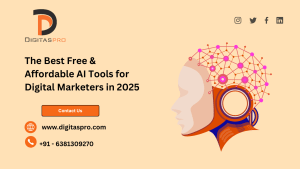In today’s highly competitive, fast-paced digital environment, managing a business effectively requires more than just intuition and hard work. It demands smart systems that streamline operations, improve collaboration, and offer real-time insights for informed decision-making. One such transformative system is Enterprise Resource Planning (ERP).
At DigitasPro Technologies, we’ve helped businesses of all sizes implement ERP solutions that revolutionize how they operate. In this in-depth blog, we’ll explore what ERP is, its core benefits, and why it has become a must-have for businesses striving for growth and operational excellence.
Table of Contents
- What is ERP?
- Evolution of ERP Systems
- Why ERP is Crucial for Business Success
- Centralized Information System
- Streamlined Business Processes
- Improved Collaboration
- Enhanced Productivity
- Real-Time Data and Analytics
- Better Compliance and Risk Management
- Scalability and Flexibility
- Cost Efficiency
- Key ERP Modules
- ERP for Different Industries
- Choosing the Right ERP
- DigitasPro Technologies ERP Services
- Final Thoughts
1. What is ERP?
ERP, or Enterprise Resource Planning, is a suite of integrated applications that organizations use to manage day-to-day business activities such as accounting, procurement, project management, supply chain operations, risk management, and compliance.
ERP systems also provide real-time data visibility across departments, helping businesses operate more efficiently, avoid data silos, and make more strategic decisions.
2. Evolution of ERP Systems
ERP systems have evolved significantly from their origin in manufacturing. Initially, they were basic inventory management systems. Over the decades, they’ve become comprehensive platforms that manage every aspect of a business.
Today, cloud-based ERPs, AI-driven insights, mobile access, and IoT integrations make ERP systems more powerful and accessible than ever before.
3. Why ERP is Crucial for Business Success
Centralized Information System
An ERP integrates all your business data in one place—finance, HR, supply chain, sales, and customer service. This eliminates the need for multiple tools and minimizes errors caused by data duplication.
Benefits:
- One source of truth
- Enhanced data accuracy
- Reduced time spent on manual data entry
Streamlined Business Processes
ERP systems standardize and automate business processes, improving efficiency and ensuring consistency across departments.
Benefits:
- Faster workflows
- Clear accountability
- Greater process transparency
Improved Collaboration
When data is shared across departments in real time, collaboration becomes easier. Employees can make informed decisions based on shared insights.
Benefits:
- Cross-functional teamwork
- Reduced communication gaps
- Increased agility
Enhanced Productivity
Automation of repetitive tasks like payroll, inventory updates, and invoicing frees employees to focus on strategic activities.
Benefits:
- Time savings
- Lower operational burden
- Increased focus on business goals
Real-Time Data and Analytics
Modern ERP systems come with dashboards and reporting tools that provide real-time visibility into operations and KPIs.
Benefits:
- Data-driven decision-making
- Accurate forecasting
- Quick response to business changes
Better Compliance and Risk Management
ERP systems help ensure regulatory compliance by maintaining audit trails, standardizing operations, and offering built-in risk management tools.
Benefits:
- Simplified reporting
- Minimized financial risk
- Greater accountability
Scalability and Flexibility
As businesses grow, their needs change. ERP systems are designed to scale and adapt through modular expansions and custom configurations.
Benefits:
- Supports business growth
- Customizable for different functions
- Handles multiple locations or business units
Cost Efficiency
Though ERP implementation requires an upfront investment, it reduces costs in the long run by improving efficiency, minimizing manual errors, and enhancing customer satisfaction.
Benefits:
- Reduced IT and operational costs
- Higher ROI
- Improved resource utilization
4. Key ERP Modules
ERP systems are made up of different modules that serve specific functions. Here are some core modules:
- Finance and Accounting: Tracks financial transactions, budgets, and reporting.
- Human Resource Management (HRM): Manages employee data, payroll, recruitment, and training.
- Inventory and Supply Chain: Optimizes stock levels, tracks inventory, and manages supplier relationships.
- Customer Relationship Management (CRM): Improves sales, marketing, and customer service efforts.
- Manufacturing: Manages production planning, scheduling, and quality control.
- Project Management: Tracks project progress, resources, and budgets.
5. ERP for Different Industries
Manufacturing
- Streamlines production processes
- Monitors quality and inventory
- Manages supplier and vendor relationships
Retail and E-commerce
- Tracks sales and inventory in real time
- Enables omnichannel experiences
- Integrates with POS systems
Healthcare
- Manages patient data, inventory, and compliance
- Tracks appointments and billing
- Enhances data security
Education
- Handles admissions, payroll, and student records
- Simplifies scheduling and attendance tracking
- Integrates learning management systems (LMS)
Construction
- Manages project timelines, budgets, and contractors
- Tracks procurement and documentation
- Enables field-to-office communication
6. Choosing the Right ERP
When selecting an ERP, consider:
- Business Size & Industry: Choose an ERP that aligns with your industry-specific needs.
- Cloud vs. On-premise: Cloud ERPs offer flexibility and lower infrastructure costs.
- Customization & Integration: Ensure it can integrate with your existing tools.
- Vendor Support: Choose a vendor with a strong track record and support system.
- Budget & ROI: Focus on long-term value rather than just initial costs.
7. DigitasPro Technologies ERP Services
At DigitasPro Technologies, we provide tailored ERP solutions that match your business needs. Our services include:
- ERP consultation and needs assessment
- ERP software selection and licensing
- System implementation and data migration
- Custom development and module integration
- Staff training and onboarding
- Ongoing support and maintenance
Platforms we support:
- Odoo
- SAP Business One
- Zoho ERP
- Microsoft Dynamics 365
- Tally ERP
Whether you’re a startup or an enterprise, we help you unlock the full potential of ERP to drive performance and scale operations.
8. Final Thoughts
ERP is more than just software—it’s a business philosophy. It brings structure, accountability, and intelligence to every corner of your business. As industries become more dynamic and data-driven, an ERP system will no longer be a choice but a necessity.
By partnering with DigitasPro Technologies, you gain access to industry expertise, robust ERP platforms, and a dedicated team committed to your digital transformation.
Ready to transform your business with ERP? Contact us today for a free ERP consultation.
Website: www.digitaspro.com
Email: ping@digitaspro.com
Phone: +91-6381309270



